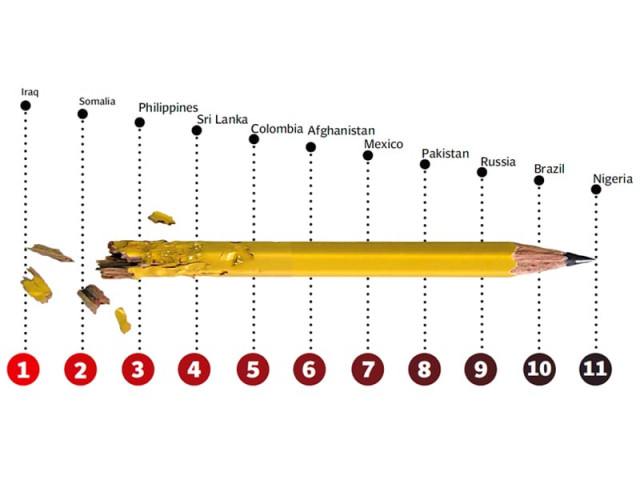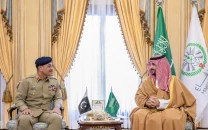Pakistan: No place for journalists
CPJ’s annual report indicates a steady rise in anti-press violence.

CPJ’s annual report indicates a steady rise in anti-press violence.
Anti-press violence has gained intensity during the past five years, propelling Pakistan to the spot of the eighth most dangerous nation for journalists, according to the Committee to Protect Journalists 2013 report based on its updated Impunity Index.
Jarring statistics, fuelled by the recent spate of violence throughout the nation, showed that in 2012 alone, Pakistan saw five journalist murders. Furthermore, of the 23 murders that occurred over the past decade, not a single suspect was prosecuted.
The global index, which picks out the worst countries for unpunished and fatal violence against journalists, also found soaring impunity rates in Somalia and Brazil. Iraq, with a horrible record for impunity, took the first spot.
Downward spiral
Just last year, Pakistan took the 10th spot in the same CPJ report. This year, the country is pegged at the 8th worst place for the press, and has been declared more dangerous than Russia, Brazil, Nigeria and India.
According to Myra Imran, an active journalist and convener of the Women Journalists Pakistan group, Pakistan today is more dangerous for the press simply because it is more dangerous for everyone.
“The law and order situation has worsened over all,” she says. “This deterioration of the condition affects everyone, not just reporters and media crew.”
Furthermore, Imran expresses skepticism over such international reports.
“These reports, which keep driving Pakistan down a notch or two each year, are demoralising in nature. They illustrate the worst, even though there’s also a lot of good going on,” exclaims the journalist. “We have great investigative reporting being done, we have great political participation, fast legislation – especially that related to women’s issues – taking shape. However, all this is ignored. Just look at all the women journalists around and the calibre of their work.”
The blame game
The report says that journalists working in Pakistan find themselves hinged upon a dual-faced blade: they are targeted by militants and by political and intelligence operatives.
“Police and prosecutors face such severe political intimidation that they have been rendered incapable of prosecuting the crimes effectively,” states the report, adding that the main reason for impunity is the lack of strong political will to prosecute.
However, professionals working within the field also hold media owners accountable. According to them, journalists not only have to face threats from militants and security agencies, but also have to deal with nerve-wracking pressure from media organizations.
“The situation needs and demands seriousness from all media owners,” says Tasneem Ahmar, head of Uks Research Centre, a media advocacy and monitoring organisation. “Generally, what happens is that reporters and crew members are sent out into the field, into volatile situations, without proper training and without proper guidelines. Pressured to outdo one another, they often end up risking their lives.”
Ahmar stresses upon the need for guidelines and proper training for journalists, similar to the procedures in place at international media houses such as the BBC and CNN.
In the same vein, Imran, too, agrees that a collective effort should be made by media group owners and journalists from all spectrums. However, she also emphasises upon the government’s role.
“Our institutions are not developed at all. The government needs to step in. This process needs to start, so that the press can be more effective, and journalists can be safer,” she says. “Journalists are our public opinion makers. Everyone needs to come together and protect them.”
Published in The Express Tribune, May 4th, 2013.



















COMMENTS
Comments are moderated and generally will be posted if they are on-topic and not abusive.
For more information, please see our Comments FAQ